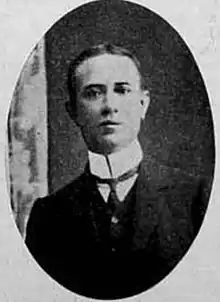Maulana Mazharul Haque
Maulana Mazharul Haque (22 December 1886 – 2 January 1930) was an educationist, a lawyer, independence activist and a freedom fighter of the Indian National Movement.[1]
Maulana Mazharul Haque | |
|---|---|
 | |
| Born | 22 December 1886 |
| Died | 2 January 1930 (aged 43) |
| Occupation | Theologian, educationist, political activist & freedom fighter, Lawyer |
| Political party | Indian National Congress |
Early life and education
Maulana Mazharul Haque was born on 22 December 1886 in Brahmpur, Patna, Bihar.[2]
He got his early education at Patna College and Canning College, Lucknow, and moved to England in 1888 to pursue legal studies. There he was introduced to Mahatma Gandhi, which lasted a lifetime.
He constructed a house in [[Faridpur siwan bihar] and named it Ashiyana. In the 18th Century, Ashiyana was a center for Freedom Fighters and it was visited by many nationalists, including Dr. Rajendra Prasad and Mahatma Gandhi.[3]
Life after 1891
In 1891, he returned to India as a barrister and joined the judicial services. In 1896, he started practicing as a lawyer. In 1906, he left Chhapra and started practicing in Patna and in the same year he was elected Vice-President of Bihar Congress Committee.
Between 1910 - 11 he was elected a member of the Imperial Legislative Council of India (British Parliament). In 1911, a third "Bihar State Conference" was held under the chairmanship of Maulana at the conference to demand a separate Bihar state.
He played an important role in the Treaty of Indian National Congress and Muslim League in 1916. Joined the Home Rule Movement started by Mrs. Annie Besant in 1916. Actively participated in the Champaran Satyagraha in 1917. Mahatma Gandhi's guest hospitality came to Patna for Champaran Satyagraha at his home "Sikandar Manzil"
During 1919, he played an active role in the Khilafat Movement and in 1920 by joining the Non-Cooperation Movement on Gandhiji's call. In 1921, Gandhiji was impressed and established "Sadaqat Ashram" (abode of truth) in Patna. From the same ashram, Maulana started a weekly magazine called "Motherland". He was a strong advocate of Hindu-Muslim unity. His statement was "Whether we are Hindus or Muslims, we are on the same boat. If we overcome, we will sink, we will sink together.
Announced his retirement from active politics in the year 1926. But leaders like Mahatma Gandhi, Maulana Azad and Nehru never left him. But regrettably he could not see independent India and on 2 January 1930, said goodbye to this world.
A stamp was issued in his honor by the Indian Postal Service in 1981 and in 1998, Maulana Mazharul Haq Arabic Persian University was established in Patna in his memory. Which will always remind him of his contribution. [4]
Citated Sources
- Prasad, Rajendra (1946). India Divided.
- Kumar, Nirmal (2009). Mazharul Haque- A Political Biography. ISBN 9788190761307.
References
- Kumar, Abhay. "Bihar Vidyapeeth Founded by Gandhi to be revived". Deccan herald. Retrieved 29 September 2020.
- Raza, Sayed (2009–2010). "Mazharul Haque: A pioneer of Sadaqat Ashram and Bihar Vidyapith". Proceedings of the Indian History Congress. 70: 705–712. JSTOR 44147718. Retrieved 29 September 2020.
- K Singh, Rakesh. "Centre of freedom movement cries for attention- ruins tells us a sad story of neglect and mismanagement face by place of Maulana Mazharul Haque". The Telegraph. Retrieved 29 September 2020.
- "Maulana Mazharul Haque, who strongly believed in sacrificing personal interests for achieving common interests". Heritage times.com.
- Khan, MI. "With Gandhian heritage, campus in shambles, what is Bihar Vidyapeeth's future?". Firstpost.com. Retrieved 29 September 2020.